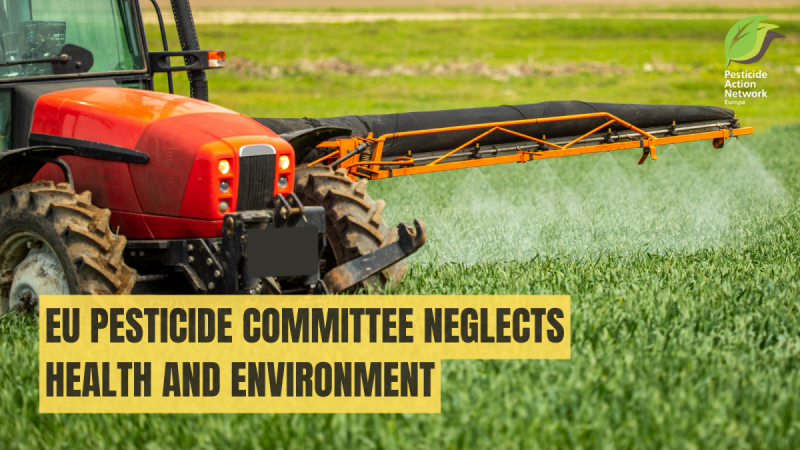The pesticide committee meeting (SCoPAFF) this week showcases significant shortcomings in the way European authorities address critical health and environmental risks related to pesticides. Despite clear scientific evidence and legal obligations, the European Commission is proposing to renew several harmful pesticides. One is linked to Parkinson's disease, while other endocrine-disrupting, reprotoxic and PFAS pesticides may continue their destructive work. Many proposed decisions blatantly disregard the safety requirements of the Pesticide Regulation and conflict with a recent ruling by the European Court of Justice. Still, it looks like the EU countries' representatives will support the proposals.
Captan: risk can't be kept inside a glass house
One of the key issues under discussion is the renewal of approval for captan. This fungicide is suspected of being toxic to reproduction and of causing cancer. Despite its well-documented risks -including its contamination of groundwater and exposure of non-target species, even in greenhouse settings- the EU Commission has proposed its renewal.
Metconazole: overlooking reproductive toxicity and suspected endocrine disruption
The proposal to renew metconazole, a fungicide with significant reproductive toxicity concerns, is equally troubling. Metconazole and to a greater extent its metabolite 1,2,4 triazole can damage fertility and impact the development of the unborn foetus. This evidently poses high risks to human health, particularly to pregnant women and children. Furthermore, its potential role in promoting azole-resistant strains of Aspergillus fungi could have negative implications in critical medical treatments. This is a concern that the EU Commission seems to completely overlook.
Folpet: ignoring neurotoxicity and carcinogenicity
Despite substantial evidence of folpet's neurotoxic and carcinogenic effects, the Commission is moving forward with the renewal of this fungicide. Scientific research has linked folpet to Parkinson's disease and cancer, yet these findings are insufficiently considered in the regulatory process.
Metrafenone: lack of conclusion on its endocrine-disrupting properties
Despite EFSA’s conclusion that it needs further data to conclude on the endocrine-disrupting properties of this fungicide, the Commission plans to renew its approval. This contradicts the pesticide regulation and ECHA/EFSA guidelines on endocrine disruption assessment.
Delaying crucial action to protect health and the environment
PFAS
For months, PAN Europe has called upon the Commission and Member States to ban PFAS pesticides. Since these are biologically active substances, their ban can be based on their persistence alone to prevent irreversible impacts on human health and the environment. Yet, three PFAS pesticides have stalled under ‘discussion issues’ over the last months with no actual progress to better regulate them. These are flutolanil, tritosulfuron and pydiflumetofen. The last one might exhibit one of the highest persistence ever measured in pesticides by regulators potentially exceeding even the notorious DDT. Its approval in Europe would lead to historical chemical pollution.
Endocrine-disrupting pesticide for humans: metribuzin
While endocrine-disrupting pesticides shall be banned immediately to protect human health, no progress has been achieved on metribuzin since summer 2023. Interestingly, the Commission met with the industry’s applicant and is, (as a follow-up?), asking EFSA to look again at its conclusions and possibly update them. PAN Europe is questioning the legal basis of such a procedure. It results in the continuous exposure of citizens and the environment to a substance which is already known to disrupt thyroid function in humans and other species, and therefore clearly does not meet the approval criteria of Pesticide Regulation.
Reprotoxic pesticide: 8-hydroxyquinoline
It is known since 2019 that 8-hydroxyquinoline may negatively impact prenatal development. It is also very toxic to aquatic life with long-lasting effects. However, this ‘toxic 12’ pesticide is still approved in the EU as a result of a lengthy assessment of whether human exposure to this reprotoxicant could be negligible. EFSA’s recent conclusions clarify that no such ‘harmless’ exposure exists for the substance. This confirms that citizens are still exposed to a very harmful substance that should have been banned years ago.
Approval prolongations: delaying necessary reassessments
The extension of approval periods for substances like amisulbrom, s-abscisic acid, thiencarbazone, and valifenalate without timely re-evaluation, poses another prolonged risk to public health and the environment. These substances are known or suspected carcinogens and very toxic to the aquatic environment. Yet their reassessment has been delayed, continuing exposure.
See for more details in our May 2024 letter to SCoPAFF.
Gross negligence if law and science are ignored?
The developments show that there is no such thing as strict enforcement of the EU pesticide law prioritising the protection of our health and biodiversity over placing or maintaining pesticides in the market. Our policymakers are aware that citizens and the environment are unnecessarily and unwillingly exposed to harmful pesticides. In our recent blog, we highlighted the example of the dangerous fungicide difenoconazole. We pose the question if it is gross negligence if the law and recent scientific evidence are disregarded. Read it here:
